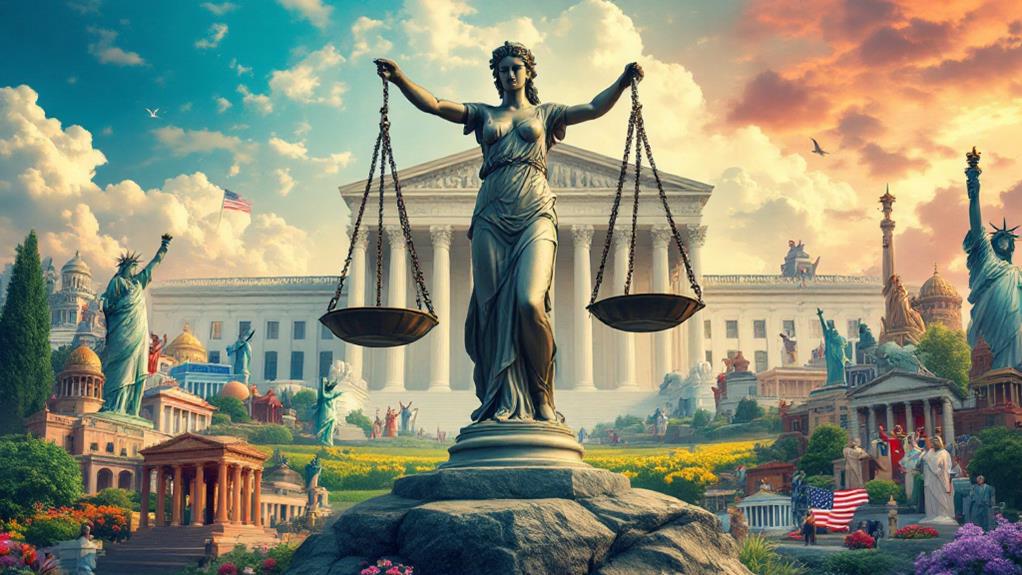Which Political Ideology Is Based on Skepticism or Opposition Toward Most Government Activities?

If you're curious about which political ideology is rooted in skepticism or opposition toward government activities, search no further than libertarianism. This ideology values individual freedom above all and minimizes government intervention. Libertarians believe in personal autonomy, free markets, and voluntary associations, arguing that society thrives when individuals make their own choices. They see the government's role as merely protecting citizens from harm while promoting free-market principles. Critics, however, caution that this hands-off approach may increase inequality and neglect public services. Exploring the intricacies of libertarianism could reveal how it contrasts with other political ideologies.
Origins of Libertarian Thought
Libertarian thought's origins trace back to the Enlightenment, a phase that emphasized individual liberty and skepticism of authority. During this transformative time, thinkers began questioning traditional institutions and advocating for personal freedoms. You'll find that historical influences like the works of John Locke and Montesquieu played critical roles. Locke, often hailed as a key figure, argued for the protection of life, liberty, and property, suggesting that governments should exist only with the consent of the governed. His ideas laid the groundwork for later libertarian principles by challenging the status quo and promoting a limited government approach. As you explore deeper, it's clear that other Enlightenment figures contributed to libertarian thought. Montesquieu's advocacy for the separation of powers helped shape the belief in limiting governmental authority to protect individual rights. These historical influences were fundamental in forming the foundation of libertarianism, as they questioned the concentration of power and championed personal autonomy. The shift in social attitudes, much like the Westernization of Japan, reflects a broader struggle between traditional values and new ideologies.
Key Principles of Libertarianism

At its core, libertarianism emphasizes individual freedom and minimal government intervention. It champions the idea that you should have the right to live your life as you see fit, as long as you don't infringe on the rights of others. This ideology is rooted in the principle of individual liberty, which holds personal autonomy and freedom of choice as paramount. You're encouraged to make your own decisions, pursue your happiness, and take responsibility for your actions. This mirrors skepticism as a stance that demands evidence and coherence, promoting inquiry into the role of government intervention.
In a libertarian world, voluntary association is a cornerstone. This means you should be free to associate with others as you choose, irrespective of whether in personal relationships or economic exchanges. Such associations are based on mutual consent and benefit, without coercion or force. You get to decide who you interact with and under what conditions, fostering a society where interactions are genuine and consensual.
Libertarianism also stresses the importance of property rights. Your ownership of property, irrespective of whether physical or intellectual, is a natural extension of your individual liberty. By respecting property rights, libertarians argue that a more prosperous and harmonious society can flourish, driven by voluntary exchanges and personal responsibility.
Libertarian Views on Government

When considering libertarian views on government, you'll find a strong preference for limiting state power to protect individual freedoms. Libertarians advocate for minimal government intervention, emphasizing the importance of personal freedom and individual rights. They believe that overreaching state authority often infringes on civil liberties, leading to unnecessary restrictions on people's lives.
In this political philosophy, voluntary cooperation between individuals is preferred over coercive government mandates. Libertarians argue that people should have the freedom to make their own choices without excessive regulation. They see the government's role as primarily to protect citizens from harm while allowing the free market to regulate itself through voluntary interactions.
Market regulation, in the libertarian view, should be minimal. The belief is that the economy functions best when left to the dynamics of supply and demand, without heavy-handed interference from the state. By minimizing government intervention, libertarians aim to create an environment where civil liberties are upheld, and personal freedoms are respected.
Ultimately, the goal is to guarantee that state authority doesn't overstep its bounds, allowing individuals to thrive and cooperate freely in a society that respects their rights and freedoms.
Economic Beliefs in Libertarianism

Economic beliefs in libertarianism center around the idea that a free market, unhindered by excessive government regulation, leads to prosperity and innovation. You believe that when individuals have the freedom to make their own economic choices, it results in a more dynamic and efficient market economy. This means businesses should operate with minimal interference, allowing supply and demand to dictate market outcomes.
In such a system, you might see how competition drives innovation and efficiency, benefiting consumers with more choices and better products. By minimizing government intervention, libertarians argue that resources are allocated more effectively, leading to a healthier economy. You emphasize the importance of protecting individual freedom, believing that people should be free to engage in voluntary exchanges without burdensome regulations.
In a libertarian market economy, you would recognize that private property rights are fundamental. These rights guarantee that individuals can own and control their resources, incentivizing them to invest and innovate. You'd also likely advocate for lower taxes, which you believe allow individuals to retain more of their earnings, thereby fostering entrepreneurship and economic growth. In general, libertarian economic beliefs prioritize individual freedom and market-driven solutions.
Social Policies and Libertarianism

Libertarianism's skepticism towards government intervention extends beyond economics and into social policies. As someone who values individual freedom, you'll find that libertarianism places a strong emphasis on minimizing government involvement in personal choices. This means supporting your right to make decisions about your body, lifestyle, and relationships without interference. Libertarians argue that you, not the government, are best equipped to decide what's right for your life.
In education, libertarians advocate for school choice, believing that you should have the freedom to choose the educational path that suits your needs, rather than being restricted by government-mandated systems. In terms of marriage, the libertarian stance is that the government shouldn't dictate who you can or cannot marry, emphasizing the importance of personal autonomy over government intervention.
Drug policy is another area where libertarians support decriminalization or legalization, trusting you to make informed choices rather than relying on governmental bans. They argue that these restrictions often lead to more harm than good. By prioritizing individual freedom, libertarianism challenges the necessity of government intervention in social policies, advocating for a society where personal choice reigns supreme.
Criticisms of Libertarian Ideology

Despite its emphasis on individual freedom, libertarian ideology faces significant criticism for its approach to governance and societal welfare. Critics argue that minimizing government intervention can lead to increased inequality and insufficient public services. You're likely to encounter several libertarian criticisms centered around the belief that a hands-off approach may not address societal needs effectively.
One common criticism is the potential for increased economic disparity. When the government steps back, wealth tends to concentrate in the hands of the few, often leaving others without vital resources. In addition, the lack of government intervention in environmental protection can lead to the exploitation of natural resources, harming both people and the planet.
Libertarians' skepticism toward government regulation can also undermine public health and safety. Without oversight, businesses might prioritize profits over safety, leading to dangerous products or unsafe working conditions. Moreover, critics say that the absence of social welfare programs can exacerbate poverty, as not everyone has equal access to economic opportunities.
Here are some key libertarian criticisms you might consider:
- Economic inequality may worsen.
- Environmental degradation could increase.
- Public health and safety might be compromised.
- Social welfare programs could be insufficient.
- Power imbalances may become more pronounced.
Libertarianism in Modern Politics

As you examine libertarianism's role in modern politics, you'll notice a dynamic and evolving landscape. Modern libertarians advocate for minimal government intervention and emphasize individual liberty. They've become increasingly influential, particularly in debates over privacy, economic freedom, and personal rights. Libertarian activism is visible in diverse political movements, often pushing back against policies perceived as overreaching or intrusive.
You'll see modern libertarians actively engaging in discussions about digital privacy, advocating for reduced government surveillance and data collection. They're also vocal about economic issues, supporting free markets and deregulation as means to foster innovation and growth. This activism extends to social issues, where libertarians often champion individual choice, regardless of whether it's in healthcare, education, or lifestyle.
In today's political climate, libertarianism serves as a counterbalance to more interventionist ideologies. It's a voice that questions the necessity of certain government actions, pushing for personal responsibility and voluntary cooperation. As you investigate political discourse, you might find that libertarian ideas resonate with those tired of traditional partisan politics, offering an alternative that prioritizes freedom and skepticism of centralized power. This ongoing influence makes libertarianism an essential part of modern political discussions.
Comparing Libertarianism With Other Ideologies

When comparing libertarianism with other political ideologies, you'll find distinct philosophical differences that shape diverse policy approaches. Libertarians prioritize individual freedom and minimal government intervention, contrasting sharply with ideologies like socialism, which advocates for extensive government control in economic matters. In contrast to conservatism, libertarianism departs on social issues, often supporting civil liberties more robustly. While liberals seek government solutions for social welfare, libertarians argue for free-market solutions and personal responsibility.
Consider these key points when evaluating libertarianism alongside other ideologies:
- Libertarian Achievements: Libertarians have successfully influenced debates on drug legalization and privacy rights, showcasing their commitment to personal freedom.
- Libertarian Challenges: Achieving widespread acceptance is difficult due to perceived extremism and lack of practical solutions for complex societal issues.
- Economic Views: Libertarians advocate for a free-market economy with minimal regulation, differing from socialist and liberal perspectives.
- Social Issues: Unlike conservatives, libertarians often promote marriage equality and drug decriminalization.
- Government Role: Libertarians consistently challenge government expansion, whereas other ideologies may support it for economic or social objectives.



